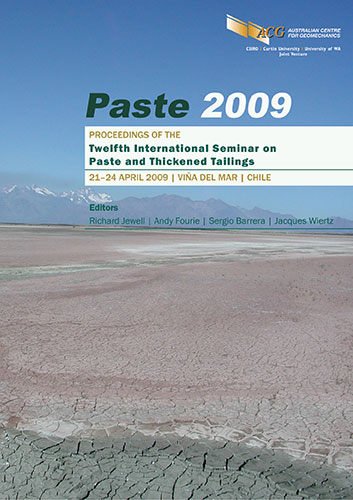Geotechnical and Structural Aspects of the Design of a Tailings Thickener

|
Authors: Clemente, JLM; de la Cuadra, P; Verdugo, A; Canteros-Gormaz, C Paper is not available for download Contact Us |
DOI https://doi.org/10.36487/ACG_repo/963_10
Cite As:
Clemente, JLM, de la Cuadra, P, Verdugo, A & Canteros-Gormaz, C 2009, 'Geotechnical and Structural Aspects of the Design of a Tailings Thickener', in R Jewell, AB Fourie, S Barrera & J Wiertz (eds), Paste 2009: Proceedings of the Twelfth International Seminar on Paste and Thickened Tailings, Australian Centre for Geomechanics, Perth, pp. 85-92, https://doi.org/10.36487/ACG_repo/963_10
Abstract:
A 135 m diameter tailings thickener for expansion of a copper concentrator was designed and built in the Chilean Andes. Design challenges included high seismicity, the presence of an existing fill layer containing large particles placed in thick lifts over a sloping ground surface with limited compaction control about 10 years prior to construction of the tailings thickener, and a previous history of settlement problems of two neighbouring thickeners. Solutions adopted for the new thickener included the use of piles to support the concrete central core of the new tailings thickener, transition concrete slabs to support the geomembrane lining system where it was connected to the concrete central core to prevent rupture of the liner in the event of seismic settlements, and continuous reinforced concrete elements for the perimeter concrete water collection system. The thickener has been built and successfully hydrotested.
References:
Badillo, E.J. and Rodríguez, A.R. (1996) Mecánica de suelos, Tomo 3, Flujo de Agua en Suelos, Editorial Limunsa.
Chilean Norm NCh2369 (NCh2369) (2003) Earthquake resistant design of industrial structures and facilities.
Collazos, H. (2005) Diseño y operación de rellenos sanitarios, Vol. 1, 2ª Ed., Mayo 2005, Escuela Colombiana de
Ingeniería.
Poulos, H.G. and Davis, E.H. (1974) Elastic solutions for soil and rock mechanics, John Wiley and Sons, New York.
92 Paste 2009, Viña del Mar, Chile
© Copyright 2026, Australian Centre for Geomechanics (ACG), The University of Western Australia. All rights reserved.
View copyright/legal information
Please direct any queries or error reports to repository-acg@uwa.edu.au
View copyright/legal information
Please direct any queries or error reports to repository-acg@uwa.edu.au